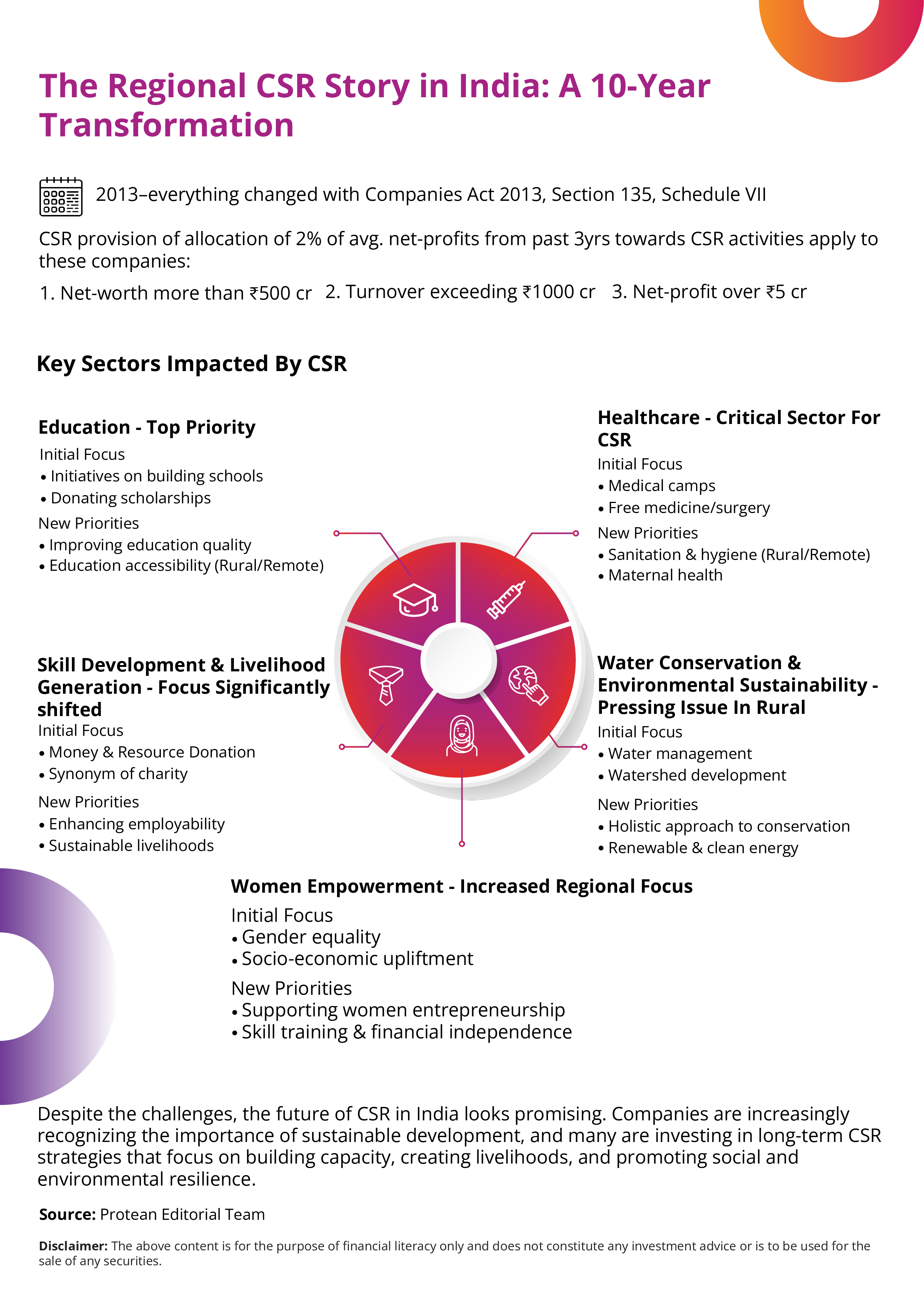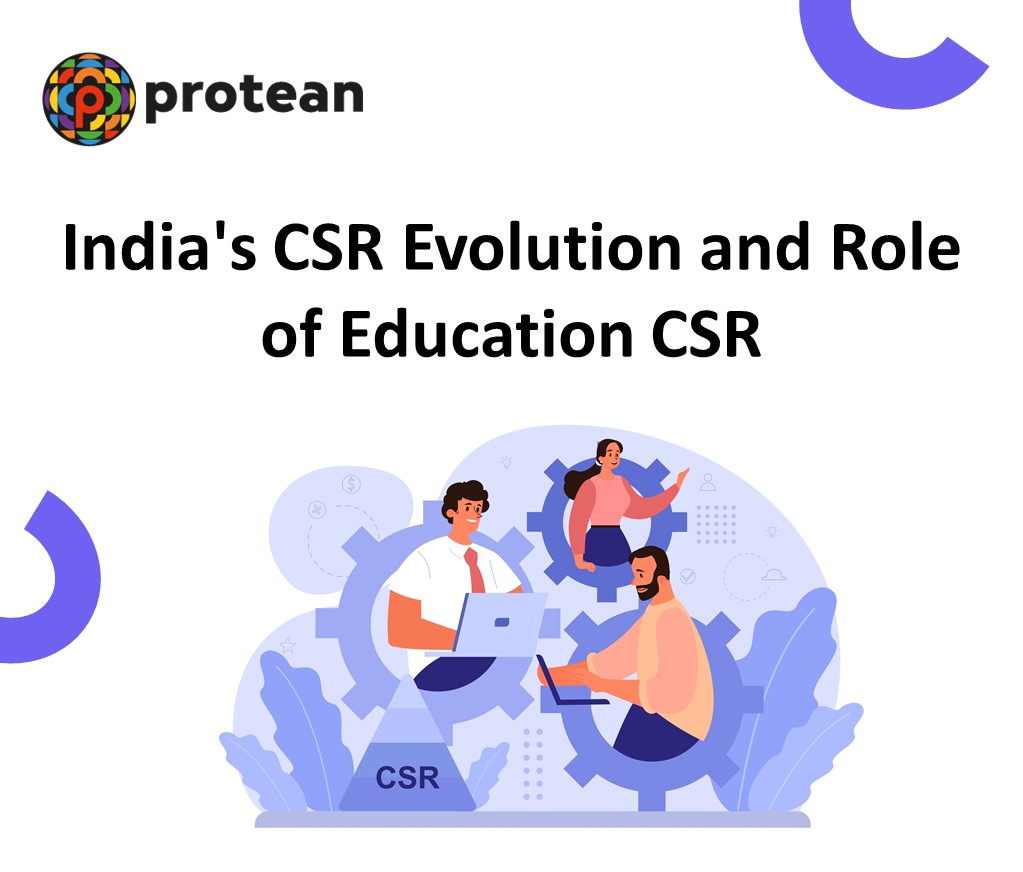Over the past decade, Corporate Social Responsibility (CSR) in India has undergone a significant transformation, particularly in regional areas. The shift from voluntary philanthropy to a mandated, structured effort has revolutionized how companies contribute to social development. CSR has now become a crucial element of corporate strategy, with a focus on sustainability, impact, and long-term change.
This transformation didn't occur spontaneously. It is the culmination of government policy, corporate innovation, and social need. Today, CSR programs are making substantial contributions to sectors like education, healthcare, water conservation, and livelihood generation, particularly in rural and regional India, where the need is most acute.
This article examines the evolution of CSR in India, focusing on regional areas over the last 10 years. It covers its origins, the legislative framework, company adaptations, key impacted sectors, and the future outlook. Real-world examples, challenges, and crucial data points are interwoven throughout the narrative.
The Genesis of CSR in India
India’s corporate sector has long had a philanthropic side. Early in the 20th century, industrialists like Jamshedji Tata and G.D. Birla pioneered the integration of business with social good. Their efforts formed the foundation for modern CSR, but these were voluntary and tended more towards charity than structured programs.
Towards the end of the 20th century, global businesses embraced CSR as a framework for ethical operations. Indian companies similarly became more aware of their social responsibilities. CSR remained optional, driven by individual corporate ethics rather than legislation.
The 2013 Companies Act: A Watershed Moment
According to section 135 of the Companies Act, 2013, certain companies are mandated to allocate 2% of their average net profits from the past three years towards CSR activities, as per Schedule VII of the Act. According to the Ministry of Corporate Affairs, the CSR provisions apply to companies with:
- Net worth of INR 500 crore or more, or
- Turnover of INR 1000 crore or more, or
- Net profit of INR 5 crore or more
during the immediately preceding financial year
CSR bolsters a company's public image and brand value, demonstrating commitment to societal betterment. It enhances media visibility and distinguishes businesses by building stronger community relationships. Looking to make a difference? Contact Protean Tech to explore CSR solutions.
This law was pivotal. It transformed CSR from a voluntary activity to a legal obligation, introducing structure, transparency, accountability, and measurable impact.
A Decade of CSR Transformation
Initially, many corporations viewed CSR as mere compliance. The focus was on fulfilling the mandate, often through one-off projects, lacking long-term impact or sustainability. This mindset has progressively shifted.
Today, CSR is a more strategic aspect of corporate operations. Companies now recognize that well-planned CSR initiatives can benefit both business and society. By aligning with the Sustainable Development Goals (SDGs) and focusing on long-term programs, businesses are making a lasting impact in areas like education, healthcare, water conservation, and skill development. This evolution is particularly transformative in regional and rural India, the focus of many of these programs. Given that the majority of India's population resides in rural areas, corporate intervention in education, healthcare, and livelihood generation is critically important.
Key Sectors Impacted by CSR
1. Education
Education has always been a top priority for CSR initiatives, and in the last decade, there has been a significant shift in how companies approach this sector.
In the early days of CSR, most educational initiatives involved building schools or donating funds for scholarships. While these are still important, the focus has now shifted toward improving the quality of education and making it more accessible, particularly in rural and remote areas.
In recent years, companies have increasingly embraced digital learning as a way to bridge the educational divide in regional India. By partnering with NGOs and the government, corporations have helped bring digital tools and learning platforms to schools that otherwise lacked resources.
Programs like the ones led by companies such as Infosys and Tata Trusts are providing students with access to online courses, educational apps, and internet-enabled devices.
Infosys' Springboard initiative is a digital platform aimed at providing free, equitable access to education and skill development, empowering students and educators with comprehensive learning resources.
The TISS Connected Learning Initiative (CLIx) focuses on enhancing education in underserved regions through innovative technology and collaborative learning, in partnership with MIT and Tata Trusts.
Protean Vidyasaarathi is a leading scholarship portal that simplifies CSR funding in education. With over ₹92 crores disbursed so far, Vidyasaarathi empowers your organization to drive meaningful change, enabling you to create and administer scholarships for students seamlessly.
During the COVID-19 pandemic, the importance of digital education became even more apparent. With schools shut and students unable to attend in-person classes, CSR programs focusing on e-learning helped ensure that education did not come to a halt.
Digital transformation is playing a pivotal role in reshaping the landscape of Corporate Social Responsibility (CSR), particularly in the education sector. With technology driving new opportunities, companies can now make a more significant impact by improving access to education. This fosters digital literacy and supports e-learning platforms in underprivileged areas. This shift not only enhances educational outcomes but also aligns with long-term CSR goals for sustainable development.
| Ready to explore CSR in education? Contact us today. |
| Learn more about digital transformation in CSR for education |
2. Healthcare
Healthcare has always been a critical sector for CSR, but the last decade has seen a marked shift in how corporations approach healthcare initiatives. In the early years of CSR, healthcare programs often focused on providing basic services like medical camps, distributing medicines, and offering free surgeries. While these are still essential, the focus is now shifting toward more sustainable, long-term healthcare solutions.
Corporates are increasingly focusing on preventive healthcare, particularly in rural India. Initiatives around sanitation, hygiene education, and maternal health are gaining traction.
For instance, companies like Reliance and Hindustan Unilever have launched programs that promote better hygiene practices, which have led to significant public health improvements in the areas where they operate.
The COVID-19 pandemic acted as a wake-up call for healthcare-focused CSR. Corporates stepped up by funding hospitals, providing medical equipment, and supporting the distribution of vaccines. More companies are now focusing on building healthcare infrastructure in rural areas and addressing issues like malnutrition, maternal health, and mental well-being.
3. Water Conservation and Environmental Sustainability
Water conservation is one of the most pressing issues in rural India, and CSR initiatives have played a key role in addressing this challenge. Over the last decade, companies have focused on water management, watershed development, and promoting renewable energy as part of their CSR efforts.
One of the key trends in this area has been the move toward integrated regional development. Companies are not just focusing on water conservation in isolation but are adopting holistic approaches that include afforestation, soil conservation, and sustainable agriculture. By working closely with local communities and NGOs, corporates are ensuring that their water conservation projects are sustainable and have a long-term impact.
Mahindra Lifespaces' water sustainability initiative focuses on conserving water through innovative solutions such as rainwater harvesting, water-efficient fixtures, and wastewater recycling. The initiative aims to reduce water consumption and enhance resource efficiency across their residential and commercial projects.
Similarly, Tata Power has been active in promoting renewable energy solutions, helping rural communities access clean, affordable energy.
4. Skill Development and Livelihood Generation
One of the most significant shifts in CSR over the last decade has been the focus on skill development and livelihood generation. In the past, CSR was often synonymous with charity—giving away money or resources without much thought about long-term impact. Today, the emphasis has shifted toward enhancing employability and creating sustainable livelihoods.
Companies are now focusing on providing vocational training and partnering with government programs like Skill India and Start-Up India. Through these initiatives, thousands of people in rural areas are receiving the training they need to find jobs in sectors like textiles, construction, and hospitality.
For example, ITC’s e-Choupal initiative has empowered farmers by providing them with real-time market information and helping them improve their agricultural practices. This not only increases farmers’ incomes but also creates a more resilient agricultural economy.
| Want to enhance your company's social impact through skill development programs? Reach out to Protean Tech. |
| Read more on the need for CSR in education |
5. Women’s Empowerment
Women’s empowerment has been a major focus for CSR, especially in regional India. Over the last decade, companies have made significant efforts to promote gender equality and provide opportunities for women to improve their economic and social status.
Many CSR programs focus on education and healthcare for women, but there is also a growing emphasis on supporting women entrepreneurs. Companies are offering financial assistance, training, and mentorship to women who want to start their own businesses. This has helped not only to boost women’s economic independence but also to break down traditional barriers and promote gender equality.
One of the key examples of CSR-driven women’s empowerment is the work done by Hindustan Unilever’s Project Shakti. This initiative empowers rural women by training them to become direct-to-home sales agents. Today, Project Shakti has helped over 100,000 women across India become financially independent.

The Evolving Role of Corporates in CSR
In the early days of CSR, many companies saw it as little more than an obligation—a box to tick to stay compliant with the law. CSR was often treated as a separate activity, detached from the company’s core business operations. However, this mindset has evolved over the last decade.
Today, companies see CSR as an opportunity to align their business goals with social impact. It’s not just about writing checks or funding projects; it’s about integrating CSR into the very fabric of the business. This shift is particularly evident in large corporations like Tata, Infosys, and Reliance, which have built entire ecosystems around their CSR efforts.
For example, Tata Group’s approach to CSR is deeply rooted in the company’s philosophy of “nation-building.” Tata’s CSR efforts are integrated into its long-term business strategy, with a focus on education, healthcare, and rural development. Similarly, Infosys has been using its technological expertise to bring digital education to underserved communities across India.
Smaller companies in regional areas have also embraced CSR as a way to contribute to local development. These businesses see CSR not just as a way to comply with regulations but as an opportunity to build goodwill and strengthen their relationships with the communities they serve.
Challenges of CSR in Regional India
While CSR in India has made tremendous strides over the last decade, it is not without its challenges—especially in regional and rural areas.
- Awareness Gap: Many communities in rural India are still unaware of the CSR programs available to them or don’t fully understand how these programs can benefit them. As a result, resources are often underutilised, and programs may fail to reach their full potential.
- Sustainability of Projects: One of the biggest challenges facing CSR projects is sustainability. While companies are eager to start new initiatives, many struggle to ensure that these projects remain effective in the long term. This is particularly true in rural areas where infrastructure and resources are limited.
- Impact Measurement: Measuring the impact of CSR initiatives in rural areas is a complex and time-consuming process. Many companies find it difficult to quantify the social and economic benefits of their programs, which can hinder further investment and development.
- Collaboration with Government: Although there is a growing trend toward public-private partnerships in CSR, there are still significant barriers to collaboration between corporates and government agencies. Bureaucratic red tape, lack of coordination, and differing priorities can make it difficult for companies to work effectively with the government on large-scale social programs.
- Geographical Barriers: Reaching remote and underdeveloped regions poses logistical challenges. Companies often struggle to implement their CSR activities in areas with poor infrastructure, inadequate transportation, and limited communication networks.
Future Outlook for CSR in India
Despite the challenges, the future of CSR in India looks promising. Companies are increasingly recognizing the importance of sustainable development, and many are investing in long-term CSR strategies that focus on building capacity, creating livelihoods, and promoting social and environmental resilience.
With the continued push for sustainability and the increasing alignment of CSR activities with global goals like the United Nations Sustainable Development Goals (SDGs), CSR in regional India is poised for even greater growth in the coming years.
The government is also likely to play a more active role in encouraging corporate participation in regional development. As public-private partnerships become more common, companies will have more opportunities to collaborate with government agencies and NGOs to create lasting change.
Conclusion
The Way Forward: Strengthening Education through CSR
As CSR evolves, education remains a vital focus area with the potential to drive long-term societal change. Strategic interventions in education can break poverty cycles, bridge regional gaps, and create a skilled workforce. Corporations can align their efforts with national priorities like the National Education Policy (NEP) 2020 to enhance access to quality education and digital learning.
Investments in infrastructure, teacher training, and curriculum enhancement are crucial for sustainable impact. By promoting education, digital tools, and vocational training, businesses can empower marginalized communities and equip future generations with skills for a globalized economy.
To maximize impact, companies must shift from one-time projects to scalable, long-term programs. Public-private partnerships can further amplify these efforts, combining corporate expertise with governmental reach. By prioritizing education, CSR can transform lives, strengthen communities, and contribute meaningfully to India’s development.
Discover how your company can contribute to CSR transformation in India. |
Also Read:
Empowering Education: The Need for CSR in India's Education Sector: [https://proteantech.in/articles/need-for-csr-in-education-sector/]
Funding the Future: How CSR Scholarships are Transforming Education: [https://proteantech.in/articles/csr-education-scholarships/]
Bridging the Gap: Vidyasaarathi's Role in CSR Education: [https://proteantech.in/articles/education-csr-vidyasaarathi/]
Unlocking Potential: CSR's Impact on Scholarship Programs Through Vidyasaarathi: [https://proteantech.in/articles/csr-impact-scholarship-vidyasaarathi/]
Maximizing Impact: Aligning Corporate Goals with CSR Scholarships through Vidyasaarathi: [https://proteantech.in/articles/scholarship-corporate-goals-vidyasaarathi/]
- Story by Bruhadeeswaran R.

